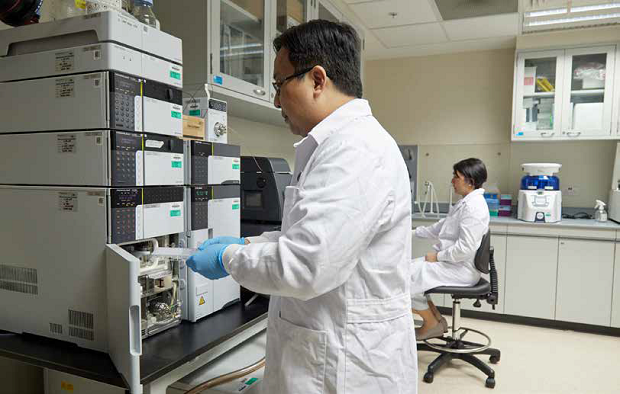
It is not enough to just prescribe the right antibiotics to fight disease. It is also necessary — and crucial — to know how patients, especially those with hard-to-treat infections, are responding to their medications.
With conditions that can fluctuate frequently — as often as hourly for those in intensive care — medication dosages have to be adjusted quickly to meet each patient’s individual clinical needs for the best outcomes. “Standard antibiotic regimens may be inadequate for these infections, which usually require a larger antibiotic dose to overcome the bacterial infection,” said Dr Lim Tze Peng, Senior Principal Pharmacist Researcher, Singapore General Hospital (SGH).
According to Dr Jasmine Chung, SeniorConsultant, Department of InfectiousDiseases, SGH, patient-related factors add to the complexity of determining antibiotic doses. These include genetic factors and underlying health issues such as obesity and poor kidney or liver functions that can affect the way these organs process antibiotics. At the same time, development of new antibiotics is slow, while antibioticresistant bacteria are rising. Thus, an individualised approach to antibiotic dosing can achieve better outcomes, particularly for intensive care patients, whose antibiotic levels are critical. “One size doesn’t fit all for therapeutic dosing as we enter the era of personalised medicine, especially for patients who are critically ill or have difficult-to-treat infections,” said Dr Chung.
As available tools can take too long or are cumbersome, especially when very sick patients are likely to be on several antibiotics at one time, a team of SGH Infectious Diseases and Pharmacy specialists worked together to develop a therapeutic drugmonitoring tool to measure the antibiotic concentration in patients’ blood.
Procedures like dialysis, for instance, can remove antibiotics from the blood. This then results in suboptimal antibiotic concentrations and poorer outcomes, even though the correct dosage was given. Current available tools can measure a limited number and type of antibiotics, and also take days for the blood samples to be analysed. SGH’s new device, however, can test for 10 commonly prescribed antibiotics used in hospitals at any one time and takes just five minutes for the results to be available.
The tool was co-developed by Dr Lim and Dr Kelvin Goh, Research Fellow, Department of Pharmacy, SGH. SGH Specialist Pharmacist Dr Nathalie Chua then led a three-year-long pilot study to examine the tool’s reliability in identifying and measuring concentration levels of antibiotics in patients on antibiotics combination therapy. The tool is designed to measure commonly used antibiotics around the world, and thus can be implemented anywhere easily, said Dr Lim.
“We are moving to the next phase — feasibility studies for this test to be used in a clinical setting,” said Dr Lim. The study aims to recruit more than 700 patients to assess if outcomes can be improved using the tool to monitor antibiotic concentrations. The team hopes to wrap up the study within three years. “We are also working closely with our colleagues in the Department of Pathology on implementing the tool and are concurrently developing a test kit for any laboratory that wants to start a clinical monitoring service. The long-term gain is to be able to commercialise this tool and enhance clinical options of this test in Singapore and the rest of the world,” added Dr Lim.
Get the latest updates about Singapore Health in your mailbox! Click here to subscribe.













 Get it on Google Play
Get it on Google Play